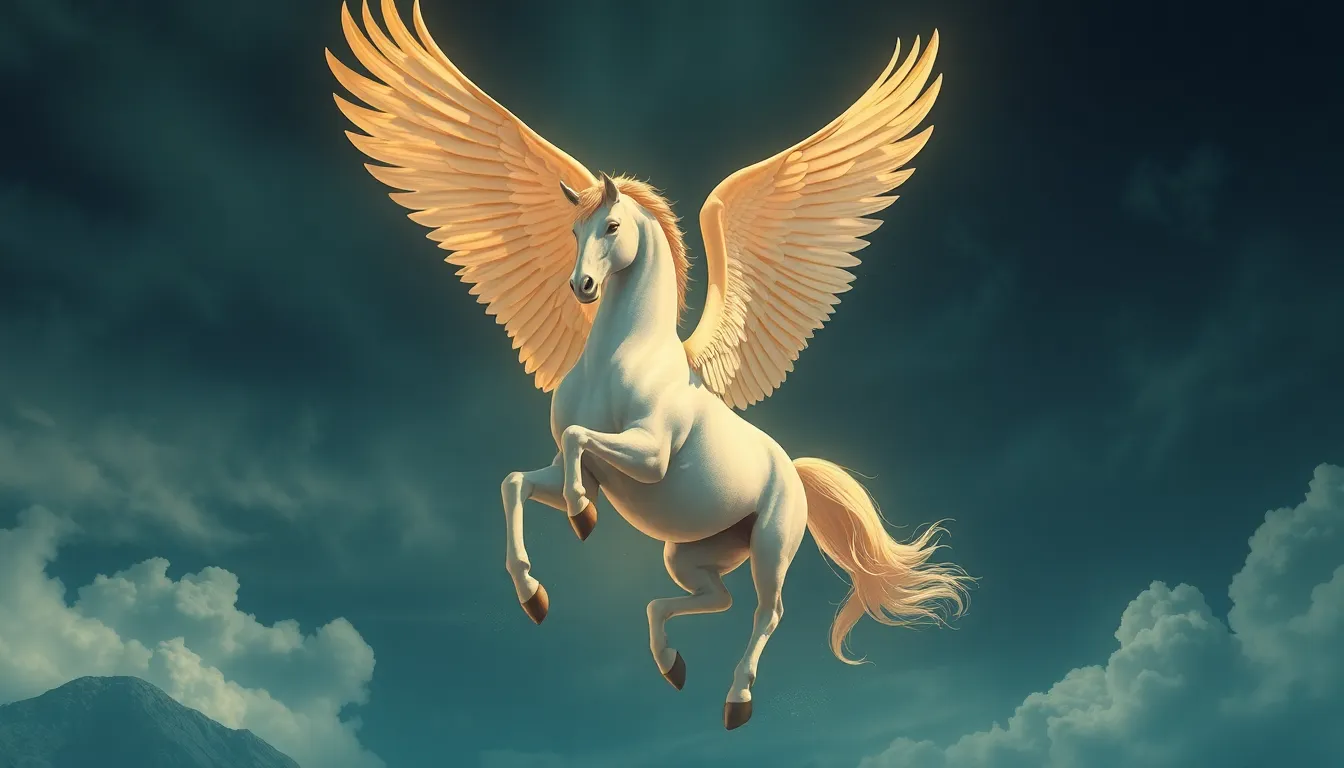The Relationship Between Pegasus and Other Greek Heroes
I. Introduction
In the rich tapestry of Greek mythology, few creatures evoke the same sense of wonder and admiration as Pegasus, the majestic winged horse. Born from the blood of the Gorgon Medusa, Pegasus is not only a symbol of beauty and grace but also serves as a vital link between various Greek heroes. This article aims to explore the multifaceted relationships between Pegasus and these heroes, shedding light on the significance of this extraordinary creature in the realm of Greek mythology.
II. The Origins of Pegasus
Pegasus’s origins are as dramatic as his adventures. He sprang forth from the blood of Medusa when she was slain by Perseus, making him a product of both beauty and tragedy.
- Birth from the blood of Medusa: When Perseus beheaded Medusa, her blood spilled onto the earth, and from it sprang Pegasus, along with the giant Chrysaor.
- Connection to the Gorgon myth: Pegasus’s birth is deeply tied to the narrative of Medusa, highlighting themes of transformation and duality—beauty and horror.
- Role of divine entities: Pegasus was nurtured by divine beings, which further emphasizes his extraordinary nature and the heroic lineage of those associated with him.
III. Pegasus and Bellerophon
One of the most famous relationships in Greek mythology is that between Pegasus and the hero Bellerophon. Their partnership is a defining moment in both of their stories.
- The heroic partnership: Bellerophon, a young hero seeking to prove himself, tamed Pegasus with the help of a golden bridle given to him by Athena. This bond forged a powerful alliance.
- Key adventures: Together, they undertook numerous adventures, most notably the defeat of the Chimera, a fire-breathing monster. Their victories showcased the strength and bravery of their partnership.
- Significance of their bond: The relationship between Bellerophon and Pegasus symbolizes the ideal hero’s journey, where divine assistance and courage lead to triumph over evil.
IV. Pegasus’s Connection to Perseus
The connection between Pegasus and Perseus is not just a matter of lineage but also one of shared heroism.
- The link between Perseus and the birth of Pegasus: Perseus’s act of slaying Medusa directly led to Pegasus’s birth, establishing a connection between the two heroes.
- Shared themes of heroism: Both Perseus and Bellerophon exemplify the traits of heroism, such as bravery, resourcefulness, and divine favor, which are often reflected in their narratives.
- Impact on legend: Perseus’s story serves as a foundational myth that enhances the legend of Pegasus, creating a legacy of heroism intertwined with the divine.
V. Pegasus and the Argonauts
In addition to his association with Bellerophon and Perseus, Pegasus has ties to the legendary Argonauts, who embarked on the quest for the Golden Fleece.
- Involvement in the quest: Although Pegasus did not accompany the Argonauts directly, his legacy looms large in their adventures, symbolizing the spirit of exploration and courage.
- Relationships with Argonauts: Notable heroes like Jason and Atalanta, who were part of the Argonauts, embody the same ideals of heroism that Pegasus represents.
- Symbolism of teamwork: Pegasus represents the importance of collaboration in achieving great feats, underscoring the collective efforts of the Argonauts in their quest.
VI. Pegasus in Relation to Other Heroes
Beyond his well-known partnerships, Pegasus has brief connections with other heroes in Greek mythology, further solidifying his status as a symbol of heroism.
- Connections with other heroes: Figures such as Heracles and Theseus interacted with the myth of Pegasus, showcasing the creature’s broader significance.
- Broader implications: Pegasus transcends individual hero narratives, representing the archetype of the hero’s journey and the divine support that accompanies it.
- Different interpretations: Each hero’s interaction with Pegasus reflects their unique qualities and challenges, highlighting the versatility of Pegasus as a symbol.
VII. Pegasus in Art and Literature
The cultural impact of Pegasus extends beyond mythology into art and literature, where he is often depicted alongside Greek heroes.
- Representation in art: Ancient Greek pottery, sculptures, and mosaics frequently feature Pegasus, symbolizing inspiration, swiftness, and the connection between the mortal and divine worlds.
- Influence on literature: Pegasus has inspired numerous works throughout history, including poetry and modern adaptations, where he continues to symbolize creativity and heroism.
- Cultural significance: As a creature of the divine, Pegasus embodies the ideals of heroism and virtue, serving as a reminder of the potential for greatness within us all.
VIII. Conclusion
In conclusion, the relationships between Pegasus and various Greek heroes illustrate the interconnectedness of their stories, each reflecting facets of heroism and divine interaction. From his dramatic origins to his enduring legacy, Pegasus remains a vital element of Greek mythology, symbolizing the ideals that define heroism across different narratives. The figure of Pegasus continues to inspire and resonate, reminding us of the timeless nature of these ancient myths and their relevance in understanding the human experience.




